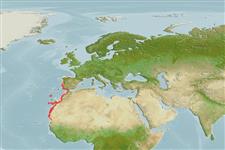Teleostei (teleosts) >
Eupercaria/misc (Various families in series Eupercaria) >
Sparidae (Porgies)
Etymology: Diplodus: Greek, diploos = twice + Greek, odous = teeth (Ref. 45335).
Eponymy: Dr Jean Cadenat (1908–1992) of the University of Dakar, was a French researcher and ichthyologist at the ‘Office de la recherche scientifique et technique outre-mer’, where he was Director of the Marine Biological Section of the Institute Français [...] (Ref. 128868), visit book page.
Environment: milieu / climate zone / depth range / distribution range
Ecology
Marine; reef-associated. Subtropical; 48°N - 15°N, 18°W - 5°W
Eastern Atlantic: from Senegal north to Madeira, Azores and Bay of Biscay.
Length at first maturity / Size / Weight / Age
Maturity: Lm 21.6 range ? - ? cm
Max length : 45.0 cm TL male/unsexed; (Ref. 2715); common length : 25.0 cm TL male/unsexed; (Ref. 2715); max. reported age: 12 years (Ref. 51001)
Forms schools. Inhabits rocky bottoms down to depths of about 150 m, but especially abundant in the surf zone; young occur in Zostera seagrass beds. Prefers to feed on small crustaceans and mollusks; also takes seaweeds and corals (Ref. 3688).
Life cycle and mating behavior
Maturity | Reproduction | Spawning | Eggs | Fecundity | Larvae
Characterized as being a digynic hermaphrodite with partial protandry (Ref. 51001).
Fricke, R., D. Golani and B. Appelbaum-Golani, 2016. Diplodus levantinus (Teleostei: Sparidae), a new species of sea bream from the southeastern Mediterranean Sea of Israel, with a checklist and a key to the species of the Diplodus sargus species group. Scientia Marina 80(3):1-16. (Ref. 110175)
IUCN Red List Status (Ref. 130435: Version 2024-2)
Threat to humans
Harmless
Human uses
Fisheries: commercial
Tools
Special reports
Download XML
Internet sources
Estimates based on models
Phylogenetic diversity index (Ref.
82804): PD
50 = 0.5000 [Uniqueness, from 0.5 = low to 2.0 = high].
Bayesian length-weight: a=0.02042 (0.01130 - 0.03688), b=2.96 (2.81 - 3.11), in cm total length, based on LWR estimates for this species & (Sub)family-body (Ref.
93245).
Trophic level (Ref.
69278): 3.1 ±0.45 se; based on food items.
Generation time: 7.5 ( na - na) years. Estimated as median ln(3)/K based on 2
growth studies.
Resilience (Ref.
120179): Low, minimum population doubling time 4.5 - 14 years (tmax=12).
Fishing Vulnerability (Ref.
59153): Moderate vulnerability (37 of 100).
